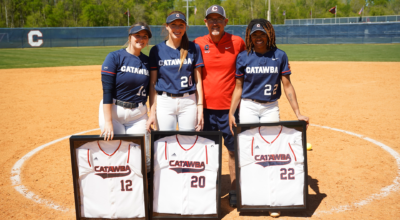Outdoors report: A good crop of acorns, good time for deer hunting
Published 12:00 am Tuesday, October 13, 2009
As cooler temperatures signal fall, deer hunters are taking advantage of the conditions to hit the woods and bag some nice trophy bucks.
Oak trees produced a bumper crop of acorns this year, with deer taking full advantage of the falling goodies. For the next several weeks, the place for a stand should be close to a white oak or other tree dropping acorns. As the acorns are eaten and disappear, deer will start hitting the food plots and bait sites more regularly.
During October, bucks will break from the bachelor groups they have been in throughout the summer and begin to prepare for the rut. Although smaller bucks may continue to move in small groups, most will become more solitary and begin the hunt for does.
Usually in Rowan and the surrounding counties the first rut occurs within the first two weeks of November. This coincides with the muzzleloader season most years.
Central deer season
Archery season for the Central Season, which includes Rowan County, ends on Nov. 6.
Muzzleloading deer season opens Nov. 7-13, with regular gun season starting Nov. 14 and continuing through Jan. 1.
Small game season for gray and red squirrels opened Oct. 1, and will close on Feb. 13, 2010. Hunters requested this date change, which opened the season sooner and ended it two weeks later. This allowed them to take advantage of an abundance of squirrels across the state. This does not include fox squirrels. The counties available to hunt these are listed on page 50 of the N.C. Regulation Digest.
Raccoon and opossum season opened on Oct. 12 at sunrise and ends on Feb 28, 2010.
Hunter safety class
A free hunter safety class will be offered Dec. 4-5 by the N.C. Wildlife Resources Commission. The course will be held at the Rowan County Rescue Squad building at 1140 Julian Road. To sign up, contact Master Officer Jeremy Harrill at 704-637-0717 before 9 p.m. or online at www.ncwildlife.org.
Disabled sportsmen programs
The N.C. General Assembly and Wildlife Resources Commission have worked cooperatively to expand opportunities for persons with disabilities to participate in hunting, fishing and other related outdoor activities.
In keeping with the intent and spirit of the Americans with Disability Act (ADA), great strides have been made toward providing reasonable access and opportunities for hunters and anglers.
North Carolina has one of the more progressive programs in the United States for sportsmen with disabilities. This effort is directed toward assisting access to favorable game and fish areas, allowing the use of equipment designed to overcome specific disabilities and to encourage persons with disabilities to take advantage of the state’s hunting and fishing opportunities.
The Commission urges anyone with a disability who has a question or an interest in hunting and fishing to contact: Disabled Access Program, N.C. Wildlife Resources Commission, 1722 Mail Service Center, Raleigh NC 27699
The Disabled Access Program and the Disabled Sportsman Program form the foundation for the Commission’s efforts to provide access and increased opportunities for persons with disabilities. The programs have different objectives. One is designed to improve access (with landowner agreement) on game lands. The other implements legislative requirements enacted by the 1993 General Assembly by providing permit hunts for persons with disabilities.
The Disabled Access Program allows people with limited physical mobility to operate vehicles on open-gated or designated roads on certain game lands otherwise closed to vehicular traffic. Participants are issued permanent identification cards, companion cards and vehicular access permits, valid as long as their disability persists. The vehicular access permit must be displayed in the passenger area of the vehicle. One able-bodied person, carrying the “Companion Card,” may accompany the person with the disability. The companion must remain in visual or verbal contact with the hunter at all times. There is no charge for this program.
Medical evidence substantiating a physical mobility disability that makes normal utilization of game lands impossible without vehicular assistance is required.
Game land areas involved are Bladen Lakes, Bertie County, Butner Falls of the Neuse (waterfowl blind for disabled hunters only), Caswell, Holly Shelter, Roanoke River wetlands, Goose Creek (waterfowl blind for disabled hunters only), Sandhills, Suggs Mill Pond and Thurmond Chatham.
The current Game Lands map book offers details at www.ncwildlife.org/Hunting.
Contact the License Section at 1-888-2HUNTFISH (1-888-248-6834) or write: Disabled Access Program, N.C. Wildlife Resources Commission, 1707 Mail Service Center, Raleigh NC 27699.
More information on a variety of public and private programs is available in Access North Carolina produced by the Vocational Rehabilitation Services, N.C. Department of Human Resources. To get it, write to: Division of Travel and Tourism, N.C. Department of Economic and Community Development, Raleigh, NC 27611 or call 1-800-Visit NC (1-800-847-4862).
For information on deer hunts, duck blinds, fishing piers and other accessible recreational opportunities on National Wildlife Refuges and National Fish Hatcheries in the state, contact: Public Affairs Office, U.S. Fish and Wildlife Service, Richard B. Russell Federal Building, 75 Spring Street, SW, Room 1200, Atlanta, GA 30303
For information on accessible National Park Service programs in the state, contact: Office of Public Affairs, National Park Service, P.O. Box 37127, Washington, D.C. 20013-7127.
For information on hunting, fishing and other accessible outdoor recreational programs on National Forests in the state, contact: Public Affairs Office, U.S. Forest Service, P.O. Box 96090, Washington, D.C. 20013-6090.
For information on North Carolina’s nature preserves, natural areas, parks and recreational areas contact: N.C. Division of Parks and Recreation, P.O. Box 27687, Raleigh, NC 27611-7687
Fox trapping update
The publication, “County Fox Harvest Seasons Legislated by the North Carolina General Assembly,” updated in August contained incorrect details.
Five counties were mistakenly listed as having fox trapping seasons. Jones, Pamlico, Randolph, Sampson and Wayne counties have a fox hunting season only. A corrected fox law publication, updated in September, is posted on www.ncwildlife.org/Hunting and www.ncwildlife.org/Trapping.
E-mail Sgt. Anthony Sharum of the N.C. Wildlife Resources at huntfishguy66@aol.com.





